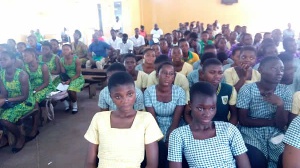Mr Issifu Salifu Kanton, Executive Director of Community Development Alliance (CDA), has said Senior High School (SHS) education in Northern Ghana is nearing a crisis level.
He said the academic calendar had been so badly affected that a three-year period of education had now been reduced to practically two years, making it difficult for effective teaching and learning.
Mr Issifu Salifu Kanton, who made this known at a press conference in Wa, attributed the situation to the consistent delay in the release of feeding grants by successive governments to cover the feeding expenses of SHS students in the Northern, Upper East and the Upper West Regions.
He said it was regrettable to note that since 1992 till date, payment of feeding grants to SHSs in the three regions has remained a challenge and posed one of the biggest threats to the delivery of quality education to the people from the affected regions”.
“As we speak, government has not released funds for the feeding of SHS students for the second and third terms of the 2015/16 academic year as well as the first term of the 2016/17 academic year periods”, he said.
Mr Kanton said the situation has compelled management of these schools to delay the admission of first year students as well as the re-opening of schools for the continuing students.
The NGO is, therefore, demanding that government release all outstanding claims of feeding fees and subsidies to all beneficiary schools within two weeks. It also demanded the immediate realignment of the academic calendar of the SHSs to enable students have at least three years of instructional period as envisaged by the policy blue print on SHS education.
In addition, it said, the progressive free scholarship scheme for the second and third terms of the 2015/16 academic year should be paid immediately to all beneficiary schools.
“We certainly have seen massive infrastructure improvement across board in SHSs. This in no doubt has increased access but the neglect of the soft issues has also negatively affected quality of education service delivery across the three regions,” Mr Kanton said. –
General News of Wednesday, 26 October 2016
Source: GNA

















